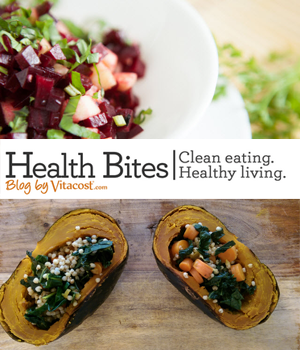Juicing: Is It Good For You?
Ever wonder if you should start juicing? Here are some helpful tips to help you decide. This is a guest post provided by Sarah Brimhall of Liquid Health, Inc. Thanks for the informative post Sarah!
Continuing to gain popularity is the idea of juicing as a way to detox your body or a means to lose weight. Juicing is when fruits and vegetables are squeezed, pressed, or mashed to extract the juice from the rest of the food, for quick and easy consumption. The idea is that by ingesting these things in juice form we are giving our digestive system a rest, as well as easily increasing our daily intake of many important vitamins and nutrients. While it sounds great in theory, here are a few things to consider:
One of the first things to consider is the time spent juicing. It can be a drawback for many people, at least it is for me. You could easily find yourself spending hours preparing your fruits and vegetables, juicing them and then cleaning your machine. You can make juices ahead of time, they should last for 24-48 hours when kept cold. Some of the nutrients will dissipate at time goes, but you can shake up the juice if it separates and enjoy some in the afternoon that you made fresh that morning or the morning before.
By extracting the juice and leaving behind the meat or pulp of the fruit or vegetable, you are missing out on a very import thing: fiber. Fiber can help with everything from lowering a person’s cholesterol, regulating blood sugar to preventing constipation. The fact is, most American’s do not get enough fiber in their diets already, so utilizing something like juicing on a regular or exclusive basis further reduces our intake of this very important nutrient. Juicing is beneficial for those with chronic digestive conditions such as Crohn’s disease or Ulcerative Colitis, when less fiber is ideal. Juicing can be very helpful for these conditions.
Juicing does provide an alternative for people who have a hard time eating their daily recommended amounts of fruits and vegetables. These foods are extremely important to achieving and maintaining a healthy life. Because of its liquid form, juicing does allow your body to absorb the vitamins, minerals and nutrients contained in the juice much easier than when eating their wholefood counterparts. This is much like taking a liquid vitamin supplement. A liquid daily multiple, such as Liquid Health’s Complete Multiple, provides whole food based vitamins, minerals and nutrients, as well as the all important fiber that’s missing when fruits and vegetables are juiced.
It’s important to be aware of your fruit and vegetable intake and what your daily needs are. It is recommended that we have 2 cups (4 servings) of fruits and 2.5 cups (5 servings) of vegetables a day. The thing to be careful of when drinking fruit and vegetable juice is that it can be really dense with calories and not fill you up the way eating that same fruit or vegetables would, so you can really add to your caloric intake if you’re not careful.
Nothing can replace a healthy diet and consistent exercise, but juicing does provide an option for increasing our daily intake of many important vitamins and nutrients. At the end of the day, juicing is better than not eating those fruits and vegetables at all. But, as with most things, moderation is key to insure a healthy balance of everything our body needs to function on a healthy and efficient level.
About the Author:
Sarah Brimhall is a blogger for Liquid Health, Inc. , http://nextstepnutrition.com/ She graduated from Wartburg College in 2002 with a degree in Communications and has worked for Liquid Health, Inc. for 8 years. As a mother of two, Sarah is particularly interested in learning how to live a healthy lifestyle and helping her family to do the same with liquid vitamins and liquid supplements such as liquid raspberry ketone.


